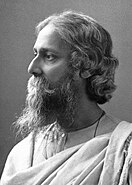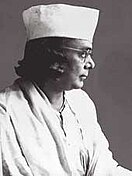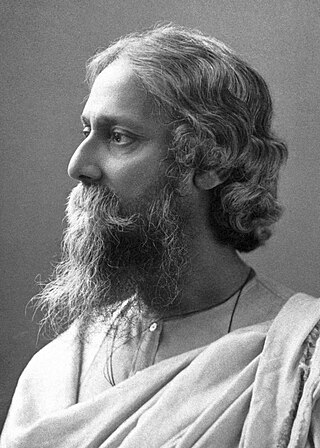
Bengali poetry is a rich tradition of poetry in the Bengali language and has many different forms. Originating in Bengal, the history of Bengali poetry underwent three successive stages of development: poetry of the early age, the Medieval period and the age of modern poetry. All ages have seen different forms of poetry and poetical tradition. It reached the pinnacle during the Bengali Renaissance period although it has a rich tradition and has grown independent of the movement. Major Bengali Poets throughout the ages are Chandidas, Alaol, Ramprasad Sen, Michael Madhusudan Dutt, Nabinchandra Sen, Rabindranath Tagore, Dwijendralal Ray, Satyendranath Dutta, Kazi Nazrul Islam, Jibanananda Das, Jasimuddin, Sukanta Battacharya, Al Mahmud.
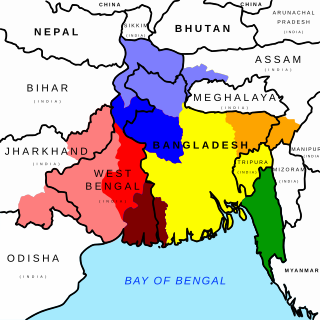
Bengali music comprises a long tradition of religious and secular song-writing over a period of almost a millennium. Composed with lyrics in the Bengali language, Bengali music spans a wide variety of styles.
Bengali Brahmos are those who adhere to Brahmoism, the philosophy of Brahmo Samaj which was founded by Raja Rammohan Roy. A recent publication describes the disproportionate influence of Brahmos on India's development post-19th Century as unparalleled in recent times.
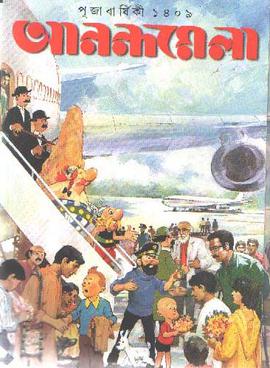
Anandamela, Anondamela, or Anondomela is a children's periodical in the Bengali language published by the ABP Group from Kolkata, India.

The Pashchimbanga Bangla Akademi is the official regulatory body of the Bengali language in West Bengal, India. It was founded on 20 May 1986 in Kolkata to act as the official authority of the language and is entrusted with the responsibility of reforming Bengali spelling and grammar, compiling dictionaries, encyclopedias and terminologies and promoting Bengali language and culture in West Bengal. Though the Akademi has no enforcement power over their rules and regulations, they are widely accepted by the Governments of West Bengal and Tripura as well as a considerable number of private publishing houses and institutions such as the Oxford University Press and the Ramakrishna Mission.

Bengali literature denotes the body of writings in the Bengali language and which covers Old Bengali, Middle- Bengali and Modern Bengali with the changes through the passage of time and dynastic patronization or non-patronization. Bengali has developed over the course of roughly 1,300 years. If the emergence of the Bengali literature supposes to date back to roughly 650 AD, the development of Bengali literature claims to be 1600 years old. The earliest extant work in Bengali literature is the Charyapada, a collection of Buddhist mystic songs in Old Bengali dating back to the 10th and 11th centuries. The timeline of Bengali literature is divided into three periods: ancient (650–1200), medieval (1200–1800) and modern. Medieval Bengali literature consists of various poetic genres, including Hindu religious scriptures, Islamic epics, Vaishnava texts, translations of Arabic, Persian and Sanskrit texts, and secular texts by Muslim poets. Novels were introduced in the mid-19th century. Nobel laureate Rabindranath Tagore is the best known figure of Bengali literature to the world. Kazi Nazrul Islam, notable for his activism and anti-British literature, was described as the Rebel Poet and is now recognised as the National poet of Bangladesh.

Bengali novels occupy a major part of Bengali literature. Despite the evidence of Bengali literary traditions dating back to the 7th century, the format of novel or prose writing did not fully emerge until the early nineteenth century. The development of Bengali novel was fueled by colonial encounter, booming print culture, growth of urban centers, and increased middle-class readership Upanyas, the Bangla word for novel, is derived from the words upanay and upanyasta.
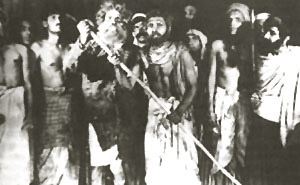
Bengali theatre primarily refers to theatre performed in the Bengali language. Bengali theatre is produced mainly in West Bengal, and in Bangladesh. The term may also refer to some Hindi theatres which are accepted by the Bengali people.
The Ananda Puraskar is an award for Bengali literature awarded annually by the ABP Group to writers using Bengali, usually from West Bengal, India.

The group theatre of Kolkata refers to a tradition in theatres in the Indian city Kolkata, which developed in the 1940s as an alternative to entertainment-oriented theatres. As opposed to commercial theatres, group theatre is "a theatre that is not professional or commercial", characterized by its tendency for experimentation in theme, content and production, and its aim of using the proscenium stage to highlight social messages, rather than having primarily making-money objectives.
Bankim Puraskar is the highest award given by the Government of West Bengal for contribution to Bengali fiction. The award was instituted in 1975 in memory of Bankim Chandra Chattopadhyay, a famous Bengali novelist of the 19th century. It has been brought under the aegis of Paschimbanga Bangla Akademi, functioning under the Department of Information & Cultural Affairs, in 2003. The award is handed over by the Chief Minister of West Bengal.

Byomkesh was a 2014 Indian Bengali crime fiction television series based on the Bengali sleuth Byomkesh Bakshi created by Sharadindu Bandyopadhyay. The series starred Gaurav Chakrabarty, Saugata Bandyopadhyay and Ridhima Ghosh as Byomkesh Bakshi, Ajit and Satyabati respectively. The series premiered on 20 November 2014 on Colors Bangla channel and ended on 14 November 2015. This series is re-runned on 4 March 2024. The first episode was narrated by Sabyasachi Chakrabarty.

Checkmate was an Indian Bengali television thriller series which aired on Star Jalsha from 21 January 2012 to 15 June 2012.

Netaji is a Bengali biographical soap opera on the life of Netaji Subhash Chandra Bose that premiered on 14 January 2019 and aired on Bengali GEC Zee Bangla. Based majorly on Udyata Kharga Subhash by Achintya Kumar Sengupta and produced by Surinder Films, the series stars Abhishek Bose in the eponymous role, with Basabdatta Chatterjee, marking her comeback on television, Dhruvajyoti Sarkar, Kaushik Chakraborty, Sriparna Roy, Debopriyo Sarkar, Sohan Bandopadhyay, Fahim Mirza appearing in other recurring roles. Due to the COVID-19 pandemic, the shooting of the series was stalled. It was rumoured that along with Karunamoyee Rani Rashmoni, this series will be axed the channel. Putting rest to such rumours, the shooting started from June 11 and new episodes started to air from June 15, 2020.







